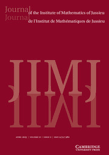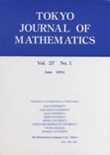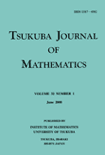
FUNDAMENTA MATHEMATICAE
Scope & Guideline
Connecting mathematicians through groundbreaking discoveries.
Introduction
Aims and Scopes
- Dynamical Systems and Topology:
The journal publishes research on the dynamics of systems, including ergodic theory, Markov processes, and topological dynamics, contributing to a deeper understanding of system behaviors and properties. - Set Theory and Logic:
FUNDAMENTA MATHEMATICAE includes papers on foundational aspects of mathematics, particularly set theory, model theory, and various logical frameworks, which are crucial for establishing the underpinnings of mathematical structures. - Geometric and Algebraic Structures:
Research on geometric properties, algebraic structures, and their interrelations is a key focus, including topics like Coxeter groups, knot theory, and homological algebra, which explore the connections between algebra and geometry. - Measure Theory and Functional Analysis:
The journal addresses topics in measure theory, probability, and functional analysis, emphasizing the study of measures, integration, and functional spaces, providing tools for analyzing complex mathematical phenomena. - Topology and Continuum Theory:
Papers related to topology, including concepts of compactness, connectedness, and continuum theory, are prominent, reflecting the journal's commitment to exploring the intricate properties of topological spaces.
Trending and Emerging
- Ergodic Theory and Dynamical Systems:
There is a noticeable increase in research related to ergodic theory and dynamical systems, reflecting a growing interest in understanding the long-term behavior of complex systems and their statistical properties. - Descriptive Set Theory and Definability:
Emerging themes in descriptive set theory and definability are becoming more prevalent, highlighting the interplay between set theory and topology, and addressing foundational questions about definable sets and functions. - Higher-Dimensional Topology and Algebraic Structures:
Research focusing on higher-dimensional topological spaces and their algebraic counterparts, such as homotopy theory and K-theory, is gaining momentum, showcasing an increased interest in the interactions between topology and algebra. - Measure and Category Theory:
There is a trend towards exploring connections between measure theory and category theory, particularly in the context of definability and structural properties of mathematical objects, reflecting a broader integration of different mathematical disciplines.
Declining or Waning
- Classical Geometry:
Topics directly related to classical geometric constructions and properties have seen a decline, as contemporary research increasingly emphasizes algebraic and topological approaches over traditional geometric methods. - Elementary Number Theory:
Research focusing on basic number-theoretic problems has become less frequent, with a shift towards more abstract and higher-dimensional number theory, reflecting evolving interests within the mathematical community. - Combinatorial Geometry:
The area of combinatorial geometry, while still relevant, has not been a central theme in recent publications, indicating a possible shift towards more analytical and algebraic perspectives in geometric research. - Purely Computational Techniques:
Papers emphasizing purely computational techniques or algorithmic approaches without deeper theoretical insights appear to be less common, suggesting a move towards more theoretical or conceptual advancements in mathematics.
Similar Journals

BULLETIN OF THE BRAZILIAN MATHEMATICAL SOCIETY
Unlocking the Future of Mathematics, One Article at a TimeBulletin of the Brazilian Mathematical Society is a distinguished journal published by Springer Heidelberg, aimed at advancing the field of mathematics through the dissemination of research findings and scholarly discourse. With an ISSN of 1678-7544 and an E-ISSN of 1678-7714, this journal is indexed within the Q2 quartile in the field of mathematics (miscellaneous), reflecting its impact and relevance in the academic community. The journal has been recognized for its commitment to quality, as evidenced by its Scopus ranking within the 58th percentile among general mathematics publications. Since its inception in 1996, the Bulletin has served as a vital platform for mathematicians to share innovative ideas, theoretical advancements, and practical applications, making it essential reading for researchers, professionals, and students alike. Open access options are available, ensuring that the latest research is accessible to a wide audience, thereby fostering collaboration and growth within the mathematics community.

Selecta Mathematica-New Series
Unveiling Groundbreaking Insights in Mathematics and Physics.Selecta Mathematica-New Series is a premier academic journal published by Springer International Publishing AG, based in Switzerland. With an impressive impact in the fields of Mathematics and Physics, it is recognized in the Q1 category for both Mathematics (Miscellaneous) and Physics and Astronomy (Miscellaneous) as of 2023. Established in 1995, the journal provides a platform for rigorous peer-reviewed research, facilitating the dissemination of groundbreaking findings and theoretical advancements through its converged publication years up to 2024. Researchers and scholars seeking to stay at the forefront of mathematical and physical sciences will benefit from the journal's diverse scope and high-impact articles. Although it does not operate under an open-access model, Selecta Mathematica-New Series remains a vital resource for building knowledge and fostering collaboration among professionals and students engaged in these dynamic fields. Access to its content is essential for those aiming to deepen their understanding and contribute to the ongoing dialogue within the scientific community.

Bulletin Mathematique de la Societe des Sciences Mathematiques de Roumanie
Connecting Scholars through High-Quality Mathematical DiscourseThe Bulletin Mathematique de la Societe des Sciences Mathematiques de Roumanie, published by SOC MATEMATICE ROMANIA, is a distinguished platform dedicated to the dissemination of advanced mathematical research and developments. With ISSN 1220-3874 and E-ISSN 2065-0264, this journal serves the global mathematical community, particularly in Romania, fostering collaboration and innovation in varied mathematical disciplines. Despite being categorized in the Q3 quartile of the *Mathematics (miscellaneous)* field and holding a Scopus rank placing it in the 19th percentile, the journal remains committed to publishing high-quality articles that explore theoretical and applied mathematics. Running from 2008 to 2024, it aims to encourage the sharing of knowledge and advancements within both academic and practical domains, affirming its importance as a valuable resource for researchers, professionals, and students alike. Although the journal does not currently offer open access, it contributes to the mathematical discourse through the rigorous selection of papers that adhere to high scholarly standards.

Revista Matematica Complutense
Cultivating Excellence in Mathematical ScholarshipRevista Matematica Complutense is a prestigious peer-reviewed journal published by SPRINGER-VERLAG ITALIA SRL, specializing in the field of mathematics. With its ISSN 1139-1138 and E-ISSN 1988-2807, the journal plays a vital role in disseminating high-quality research and fostering academic discussion within the mathematics community. Recognized for its rigorous selection process, the journal has achieved impressive rankings, holding a Q1 quartile status in the miscellaneous mathematics category as of 2023 and ranking #94 out of 399 in general mathematics according to Scopus, placing it within the 76th percentile. With a publication timeline spanning from 2008 to 2024, the Revista Matematica Complutense continues to serve as an essential resource for researchers, professionals, and students alike. Although it does not currently offer open access, the journal remains committed to advancing mathematical knowledge and providing a platform for innovative research across various mathematical disciplines.

Journal of the Institute of Mathematics of Jussieu
Fostering Collaboration for Tomorrow's Mathematical BreakthroughsJournal of the Institute of Mathematics of Jussieu, published by Cambridge University Press, is a leading academic journal that has established itself as a vital resource in the field of mathematics. With an impressive impact factor and a ranking in the top quartile (Q1) of miscellaneous mathematics, the journal serves as a platform for high-quality research from both established scholars and emerging researchers. Spanning from 2002 to 2024, the journal aims to foster collaboration and innovation in the mathematical community by publishing original research articles, reviews, and critical discussions on a wide range of mathematical topics. Although the journal does not offer open access, it remains widely accessible through various academic institutions and libraries, ensuring that critical advancements in mathematics are shared with a global audience. Located in the United Kingdom at the prestigious Cambridge campus, the journal reflects the rigorous standards of its publisher and the rich academic tradition of its home institution.

Pure and Applied Mathematics Quarterly
Elevating Research in Pure and Applied MathematicsPure and Applied Mathematics Quarterly is a prestigious journal published by INT PRESS BOSTON, INC, focusing on the diverse and evolving field of mathematics. Since its inception in 2007, this journal has grown significantly, currently holding a Q1 ranking in the Mathematics (Miscellaneous) category for 2023, positioning it among the leading publications in the discipline. With a commitment to publishing high-quality research, Pure and Applied Mathematics Quarterly fosters innovation and dialogue within the mathematical community by providing a platform for theoretical advancements and practical applications. The journal remains accessible to researchers and professionals through its ISSN 1558-8599 and E-ISSN 1558-8602, although it does not currently offer open access. As a vital resource for mathematicians, educators, and students, this journal endeavors to expand the frontiers of mathematical knowledge and contribute to the academic dialogue surrounding this fundamental science.

Tokyo Journal of Mathematics
Connecting Global Minds Through Mathematical ResearchTokyo Journal of Mathematics is a prestigious journal dedicated to the dissemination of high-quality research in the field of mathematics. Founded in 1978, this journal serves as a platform for researchers to publish their findings, providing cutting-edge insights into various mathematical theories and applications. Published by the TOKYO JOURNAL MATHEMATICS EDITORIAL OFFICE ACAD CENTER, the journal is based in Japan and forms an integral part of the global mathematical community. Although listed in the Q4 quartile of Mathematics (Miscellaneous) category for 2023, its inclusion in Scopus rankings highlights its ongoing commitment to scholarly excellence. The journal does not currently offer Open Access options, thus providing readers with insightful access to critical advancements in mathematics. With an ISSN of 0387-3870 and a publication history spanning over four decades, the Tokyo Journal of Mathematics remains an essential resource for researchers, professionals, and students alike, fostering the advancement of mathematical knowledge and collaboration across borders.

Tsukuba Journal of Mathematics
Empowering Mathematicians to Share Transformative IdeasTsukuba Journal of Mathematics is a distinguished publication dedicated to advancing the field of mathematics through the dissemination of innovative research and comprehensive studies. Published by the University of Tsukuba, Department of Mathematics, this journal serves as a vital platform for mathematicians, researchers, and students to engage with cutting-edge mathematical theories and methodologies. Although currently not available as an open-access journal, it maintains a strong academic presence, contributing significantly to the global mathematical landscape. The journal invites submissions across various branches of mathematics, aiming to foster scholarly communication and collaboration. The ISSN 0387-4982 and the E-ISSN 2423-821X further establish its credibility and accessibility among the academic community, supporting its critical objective of facilitating high-quality research output. Situated in Tsukuba, Japan, a hub for scientific research and development, the Tsukuba Journal of Mathematics is committed to bridging gaps in mathematical knowledge and encouraging exploration of novel ideas.

INDIAN JOURNAL OF PURE & APPLIED MATHEMATICS
Advancing Mathematical Frontiers Since 1996INDIAN JOURNAL OF PURE & APPLIED MATHEMATICS, published by the INDIAN NATIONAL SCIENCE ACADEMY, stands as a vital resource in the realm of pure and applied mathematics since its inception in 1996. With ISSN 0019-5588 and E-ISSN 0975-7465, this journal aims to disseminate original research that advances the understanding and application of mathematical principles. Operating out of New Delhi, India, it serves a diverse readership comprising researchers, scholars, and practitioners in the mathematical sciences. Recognized within the Q3 category in both Applied Mathematics and Miscellaneous Mathematics as per the 2023 category quartiles, the journal emphasizes rigorous peer-reviewed articles that contribute to its impact in academia, reflected in its Scopus rankings. Although it does not currently operate as an open-access journal, it maintains a commitment to quality and accessibility of scholarly content, striving to foster academic collaboration and innovation. The convergence of full-text issues from 1996 to 2024 highlights its ongoing dedication to the evolution of mathematical research.

Cambridge Journal of Mathematics
Empowering Researchers with Cutting-Edge InsightsCambridge Journal of Mathematics, published by INT PRESS BOSTON, INC, is a premier platform for the dissemination of cutting-edge research in the field of mathematics. With an ISSN of 2168-0930 and E-ISSN 2168-0949, this journal stands out in a competitive academic landscape, currently ranked #58 out of 399 in General Mathematics, placing it in the top 15% within its category according to Scopus metrics. The journal serves as a vital resource for researchers, professionals, and students alike, aiming to foster groundbreaking mathematical inquiries and foster collaboration across disciplines. Published from 2020 to 2024, the Cambridge Journal of Mathematics is committed to maintaining high standards of scholarship, making it an essential read for those who are passionate about advancing mathematical knowledge and its applications.